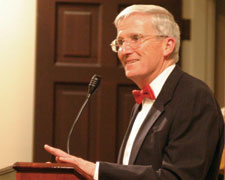 | |
|
At Wabash, I hear 'brother' many
|
Growing up Catholic, I often wondered why someone would choose to be a Brother instead of a Priest. The Priest stood at the center of everything, wearing vestments of varying colors, directing altar boys and assistants, and preaching to the congregation. Brothers stood off to the side and behind, often unnoticed and usually not speaking. For the longest time, I simply assumed that Brothers could not make it as priests, because of a failing of intellect, will, or whatever.
I learned better in high school when I came to know several Brothers. They introduced me to a world where doing good did not mean being our front and leading, where who was in charge was less important then what was done, where the work itself was its own reward, and where the communal far outweighed the personal. I know I had been taught these values earlier, but I had never seen them lived so consistently by men who clearly could have been priests, leaders, or anything else they chose.
At Wabash, I hear ‘brother’ many times a day. Usually it refers to a fraternity brother, as you would expect, but often ‘brother’ refers simply to another Wabash student. This usage seems most pronounced among fairly recent alumni, and suggests the bond that is the Wabash spirit. A bond forged of hard work and good fun, of service and success, of personal responsibility for the common good. The bond seems to link all Wabash men as well as their families, as improbable as that seems to the outside world.
Colleagues elsewhere often speculate that the bond stems from the single-sex experience at Wabash, but consultants who have tried to imitate the help we receive from alumni, especially in admissions, have not even come close. Our ties combine a liberal arts capacity for appreciating others with understanding self and the traditions of service and commitment demonstrated by our founders.
The nationwide shortage of priests reminds us that such bonds and commitments do not automatically last forever. We need to be intentional about them to assure their continuance and relevance. We shall keep these concerns in the forefront as we work on updating the College’s strategic plan. This work will continue on and off campus for most of the 2004-2005 year. I again invite you to participate by writing me or by checking with the Alumni Office to see when we’ll be holding conversations in a place near you. I look forward to hearing from you.
Contact President Ford at: forda@wabash.edu